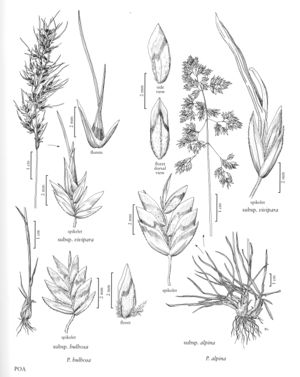Poa bulbosa subsp. vivipara
Culms 15-60 cm. Spikelets bulbiferous; florets modified into leafy bracts, sometimes the basal florets within a spikelet more or less normal. Calluses usually sparsely webbed, sometimes glabrous; lemmas glabrous or softly puberulent over the keel and lateral veins, sometimes between the veins; anthers in the least deformed florets 1.2-1.5 mm or aborted late in development, absent from modified florets. 2n = 21, 28, 31, 32, 33, 34, 35, 37, 39, 42+1, 44, 46, 48, 49.
Discussion
Poa bulbosa subsp. vivipara was introduced from Europe into the Pacific Northwest as a forage grass; it has since spread across temperate areas of the Flora region, particularly in the Pacific Northwest and northern Great Basin. It is highly tolerant of grazing and disturbance.
Selected References
None.
